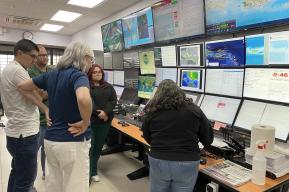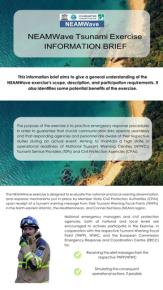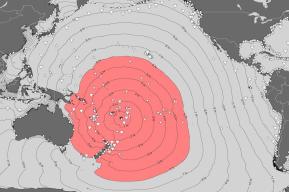News
UNESCO's IOWave23 Exercise Strengthens Indian Ocean Tsunami Preparedness

The IOWave23 Exercise featured three tsunami scenarios triggered by earthquakes in the Andaman, Makran, and Java trenches. Additionally, a fourth scenario simulated a tsunami resulting from a volcanic eruption on Heard Island in the Southern Ocean.
Nineteen Member States actively participated in one or more scenarios, including Australia, Bangladesh, France (Indian Ocean Territories), India, Indonesia, Iran, Madagascar, Maldives, Mauritius, Myanmar, Oman, Pakistan, Seychelles, Singapore, South Africa, Sri Lanka, Tanzania, Thailand, and the United Arab Emirates.
The exercise prioritized inclusivity, involving all community categories, such as men, women, children, elders, youth, and people with disabilities. This aligns with the central theme of World Tsunami Awareness Day 2023, emphasizing "Fighting Inequality for a Resilient Future."
Seven countries, including India, Indonesia, Iran, Maldives, Mauritius, Sri Lanka, and the United Arab Emirates, conducted community evacuation drills. Notable evacuations took place in India, where over 40,000 people were moved to shelters during the Andaman trench scenario, and in Indonesia, involving 11 coastal provinces during the Java trench scenario.
The exercise facilitated cooperation between National Tsunami Warning Centres, Disaster Management Organisations, first responders, and media to test national tsunami warning chains and Standard Operating Procedures.
A significant milestone was achieved during the Heard Island Volcano scenario, where the Joint Australian Tsunami Warning Center issued new tsunami threat bulletins for non-earthquake-induced tsunamis, marking a holistic approach to potential tsunami-generating events.
Mr Kevin Rae of the South Africa Weather Service remarked, “It was very encouraging to deal with a volcanic source during this exercise, as this represents a more holistic and inclusive approach, by the ICG/IOTWMS, to potential tsunami-generating events within the greater Indian Ocean basin.”
The exercise garnered extensive coverage on national broadcasting media and social media platforms, using the #iowave23 hashtag. The public outreach website www.iowave.org remains a valuable resource for information on all IOWave exercises.
Historical Context
IOWave23 is the 7th Indian Ocean-wide exercise, with previous editions held in 2009, 2011, 2014, 2016, 2018, and 2020. The initiative reflects the collective efforts of Indian Ocean nations following the 2004 tsunami disaster, leading to the establishment of the Indian Ocean Tsunami Warning and Mitigation System, fully operational since 2011 with UNESCO's support.
UNESCO's Intergovernmental Oceanographic Commission continues to play a pivotal role in fostering scientific exchange and collaborative efforts to establish effective early warning systems for tsunamis. Through stakeholder workshops, evaluations, and ocean-wide exercises like IOWave23, UNESCO's IOC assists countries in improving Standard Operating Procedures and overall scientific coordination across regions.
The successful completion of IOWave23 underscores the shared commitment of Indian Ocean nations to build resilience and enhance preparedness for potential tsunami events.
About the IOC/UNESCO:
The Intergovernmental Oceanographic Commission of UNESCO (IOC-UNESCO) promotes international cooperation in marine sciences to improve management of the ocean, coasts and marine resources. The IOC enables its 150 Member States to work together by coordinating programmes in capacity development, ocean observations and services, ocean science and tsunami warning. The work of the IOC contributes to the mission of UNESCO to promote the advancement of science and its applications to develop knowledge and capacity, key to economic and social progress, the basis of peace and sustainable development.
About the Ocean Decade 2021-2030:
Proclaimed in 2017 by the United Nations General Assembly, the UN Decade of Ocean Science for Sustainable Development (2021-2030) (‘the Ocean Decade’) seeks to stimulate ocean science and knowledge generation to reverse the decline of the state of the ocean system and catalyse new opportunities for sustainable development of this massive marine ecosystem. The vision of the Ocean Decade is ‘the science we need for the ocean we want’. The Ocean Decade provides a convening framework for scientists and stakeholders from diverse sectors to develop the scientific knowledge and the partnerships needed to accelerate and harness advances in ocean science to achieve a better understanding of the ocean system, and deliver science-based solutions to achieve the 2030 Agenda. The UN General Assembly mandated UNESCO's Intergovernmental Oceanographic Commission (IOC) to coordinate the preparations and implementation of the Decade.






